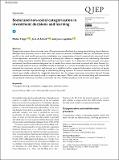Files in this item
Social and non-social categorisation in investment decisions and learning
Item metadata
| dc.contributor.author | Telga, Maïka | |
| dc.contributor.author | Alcalá, José A. A. | |
| dc.contributor.author | Lupianez, Juan | |
| dc.date.accessioned | 2023-02-09T13:30:15Z | |
| dc.date.available | 2023-02-09T13:30:15Z | |
| dc.date.issued | 2023-12-01 | |
| dc.identifier | 282908989 | |
| dc.identifier | 0044574e-4782-4130-a579-76331ee051d3 | |
| dc.identifier | 85147595432 | |
| dc.identifier.citation | Telga , M , Alcalá , J A A & Lupianez , J 2023 , ' Social and non-social categorisation in investment decisions and learning ' , The Quarterly Journal of Experimental Psychology , vol. 76 , no. 12 , pp. 2718-2731 . https://doi.org/10.1177/17470218231153137 | en |
| dc.identifier.issn | 1747-0218 | |
| dc.identifier.other | ORCID: /0000-0002-6792-0093/work/128568307 | |
| dc.identifier.uri | https://hdl.handle.net/10023/26932 | |
| dc.description | Funding: This research was supported by the Spanish Ministry of Education, Culture and Sports, with pre-doctoral FPU fellowship FPU14/07106 to MT, and the Spanish Ministry of Economy and Competitiveness, with research projects PSI2014-52764-P and PSI2017-84926-P to JL. Participation of JAA was funded by the Action 7 of the Research Support Plan of the University of Jaén. | en |
| dc.description.abstract | Categorical processes allow us to make sense of the environment effortlessly by grouping stimuli sharing relevant features. Although these processes occur in both social and non-social contexts, motivational, affective and epistemic factors specific to the social world may motivate individuation over categorisation of social compared to non-social stimuli. In one experiment, we tested this hypothesis by analysing the reliance on categorical versus individuating information when making investment decisions about social and non-social targets. In an adaptation of the iterative trust game, participants from three experimental groups had to predict the economic outcomes associated with either humans (i.e., social stimuli), artificial races (i.e., social-like stimuli), or artworks (i.e., non-social stimuli) to earn economic rewards. We observed that investment decisions with humans were initially biased by categorical information in the form of gender stereotypes, but later improved through an individuating learning approach. In contrast, decisions made with non-social stimuli were initially unbiased by categorical information, but the category-outcomes associations learned through repeated interactions were quickly used to categorise new targets. These results are discussed along with motivational and perceptual mechanisms involved in investment decisions and learning about social and non-social agents. | |
| dc.format.extent | 14 | |
| dc.format.extent | 800606 | |
| dc.language.iso | eng | |
| dc.relation.ispartof | The Quarterly Journal of Experimental Psychology | en |
| dc.subject | Trust game | en |
| dc.subject | Categorisation | en |
| dc.subject | Economic reward | en |
| dc.subject | Individuation | en |
| dc.subject | Learning | en |
| dc.subject | BF Psychology | en |
| dc.subject | DAS | en |
| dc.subject | MCC | en |
| dc.subject.lcc | BF | en |
| dc.title | Social and non-social categorisation in investment decisions and learning | en |
| dc.type | Journal article | en |
| dc.contributor.institution | University of St Andrews. School of Management | en |
| dc.identifier.doi | 10.1177/17470218231153137 | |
| dc.description.status | Peer reviewed | en |
This item appears in the following Collection(s)
Items in the St Andrews Research Repository are protected by copyright, with all rights reserved, unless otherwise indicated.

